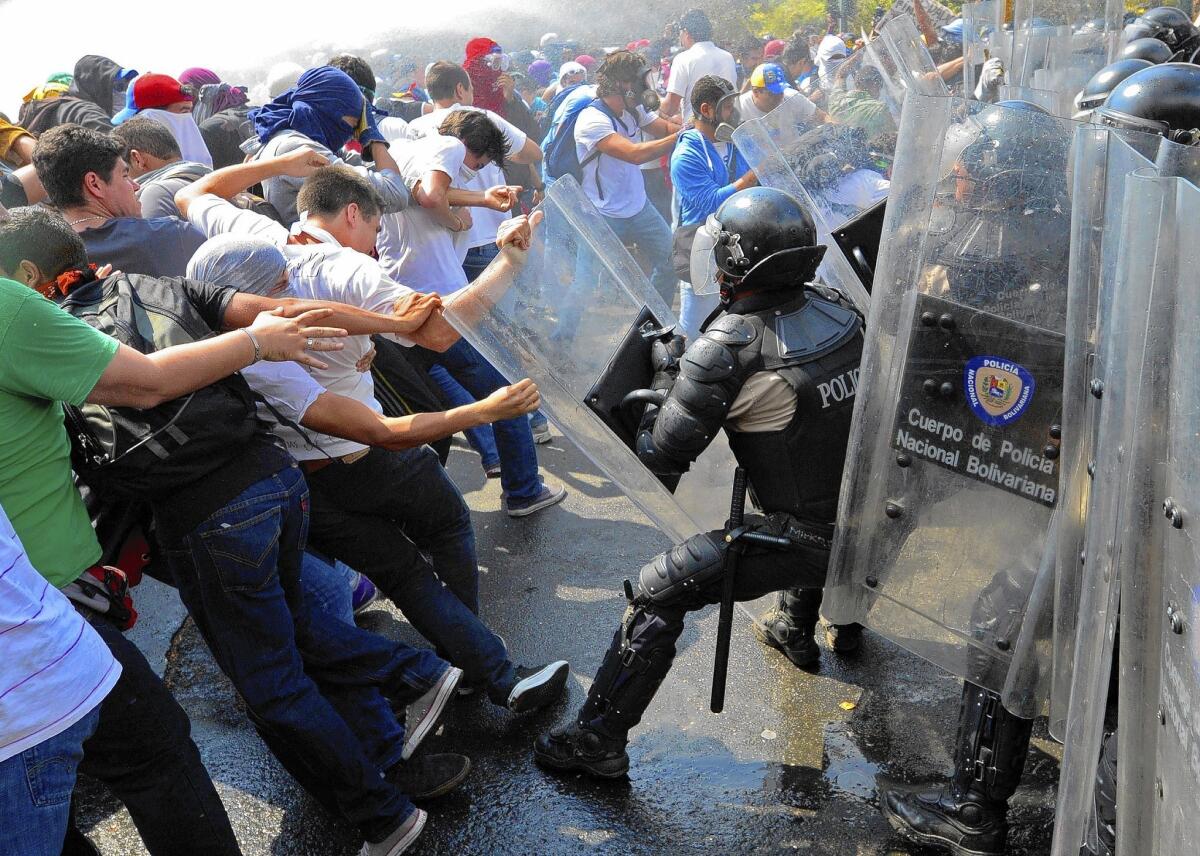Venezuela street clashes persist as death toll rises

- Share via
CARACAS, Venezuela — Government forces used water cannons and tear gas Wednesday to turn back opposition marches in the capital, where borough mayors defied a Supreme Court order that they clear street barricades.
Clouds of gas hovered near the entrance to the Central University of Venezuela in Caracas and at the adjoining Botanical Garden, where protesters had converged to join a march headed to the public defender’s office.
“It was horrible. I had to run a long way,” said Maria Alfonzo, a 22-year-old science student who was leaving the campus when she was overcome by the gas. “The National Guard is supposed to protect us, not threaten and mistreat us. We should have the right to protest.”
Meanwhile, the death toll from more than a month of often violent demonstrations against the government of President Nicolas Maduro rose to 24 Wednesday after Jesus Enrique Acosta, 23, was reported killed by a gunshot to the head in the La Isabelica barrio of Valencia, about 75 miles southwest of the capital. Six others were reported wounded by gunfire in the northern industrial city.
Witnesses said Acosta, an engineering student at the University of Carabobo, was shot by a member of the “colectivos,” motorcycle-riding vigilantes that have been blamed for other killings across Venezuela since the anti-Maduro protests erupted Feb. 12.
Among those wounded by gunfire in Valencia were at least one government supporter, Jose Diaz Garcia, who was shot in the leg as he attempted to clear a barricade. Protesters have put up hundreds of makeshift barricades in cities across Venezuela, including several neighborhoods in Caracas.
Maria Corina Machado, an opposition deputy in the National Assembly who led protests against high crime, inflation and scarcity of food and other staples, had called for students and other Maduro opponents to march from Plaza Venezuela to the public defender’s office to demand the release of students and others detained over the last month.
Supporters of the government marched to the same area, without interference from authorities, according to reporters on the scene.
The showdown with police was consistent with a government policy to restrict protest marches, often with the help of vigilantes. National Guard members in riot gear blocked a march Monday by doctors and other health workers protesting the lack of medical supplies in city hospitals.
Violence has continued to roil Venezuela this week, despite Maduro’s call last month for a peace conference to reconcile the deeply polarized sides.
On Tuesday, opposition groups in Valencia reported 12 people were injured in clashes with police, while at least 16 were injured in the western city of Merida. Also on Tuesday, local officials reported the death of 24-year-old Daniel Tinoco, a student in San Cristobal, the capital of southwestern Tachira state, the scene of some of the most violent protests.
Residents in the affluent Chacao area of eastern Caracas reported a four-hour confrontation Tuesday night between protesters and National Guard troops, who fired tear gas and rubber bullets to disperse crowds. The area’s former mayor, Leopoldo Lopez, remains jailed after his arrest Feb. 18 on charges of incitement to violence.
The Supreme Court order that local mayors clear streets of barricades came after the mayors issued a joint statement over the weekend vowing that they would defy any federal attempt to “intervene” in local government.
“We support and accompany the massive and peaceful protest that has been expressed overwhelmingly in the streets of the principal cities of the country,” said the statement signed by Carlos Ocariz, David Smolansky, Gerardo Blyde and Ramon Muchacho, all mayors of Caracas suburbs. “We are not going to attack human rights of those who demonstrate in this manner.”
Amid the ongoing unrest, Chrysler announced Wednesday it was temporarily shuttering its assembly plant in central Carabobo state for lack of components. The auto company said it would continue to pay 1,150 employees during the 60-day shutdown. The announcement came one month after Toyota Motor Corp. said it would scale back its Venezuelan assembly operations for similar reasons.
Special correspondent Mogollon reported from Caracas and special correspondent Kraul from Bogota, Colombia.
More to Read
Sign up for Essential California
The most important California stories and recommendations in your inbox every morning.
You may occasionally receive promotional content from the Los Angeles Times.













